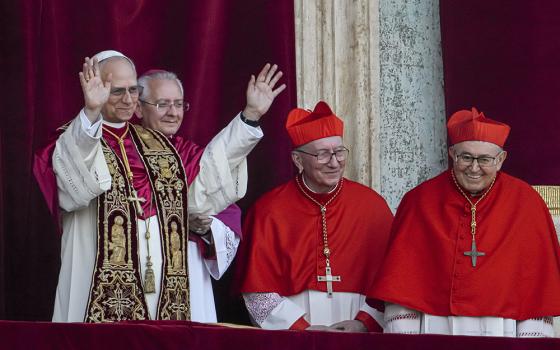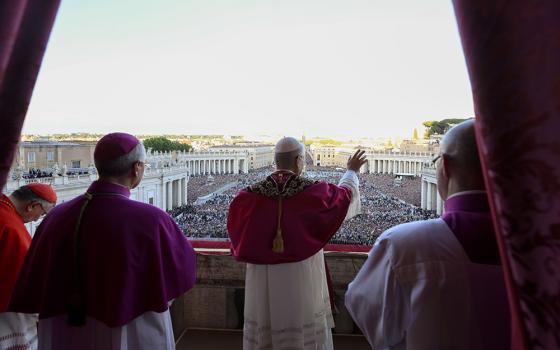Pope Francis greets a community of Benedictine nuns from Argentina before Mass in St. Peter's Basilica at the Vatican Jan. 6, 2024. (OSV News/Vatican Media)
With the death of Pope Francis, there is a common refrain in liberal Catholic spaces: Will the next pope undo the progress that he made?
There is a palpable fear in LGBTQ communities and feminist spaces in particular, for Francis was seen as an ally for marginalized groups. While we do not know who the next pope will be, as a feminist theologian, I am not worried. Yes, the next pope can enact practices that reverse Francis’ reforms — but the Francis Effect extended beyond his person or office because his reforms were based not on his personal preferences but on the movement of the Holy Spirit in the church.
One of Pope Francis’s major contributions to the church was his emphasis on synodality. He expanded the participants in the global synod, opening this process to the non-ordained. Lay men and women — some as young as college students. The 2024 synod issued an authoritative final document, including a paragraph (60) addressing women’s roles in the church, which stated: "There is no reason or impediment that should prevent women from carrying out leadership roles in the Church." Thus, the door is open to discussion surrounding what forms women’s ministry can take in the church.
"What comes from the Holy Spirit cannot be stopped," the document continues. The synod report reminds the church that reform is about more than one person. If reforms around women’s roles in the church, or the inclusion of LGBTQ Catholics, are from the Holy Spirit — and I believe they are — then they will outlast any papacy.
If reforms around women’s roles in the church, or the inclusion of LGBTQ Catholics, are from the Holy Spirit — and I believe they are — then they will outlast any papacy.
Church teaching has two components: It is issued by a teaching authority and must be received by the faithful. What this "receiving" might look like can be ambiguous. It is not a vote of agreement or a democratic poll. It is the sense of the faithful, the sensus fidei. For teaching to be authentic and authoritative, it must be lived out by the faithful. The church believes the Holy Spirit guides the hierarchy and the faithful to accept and live out church teaching. This is the ultimate failsafe, ensuring that a pope doesn’t go rogue and issue teachings that are not believed. A teaching must be received and believed to be church teaching.
In this "May Madness" of anticipating who the next pope might be, we must remember that Pope Francis appointed 108 of the 135 cardinals in the conclave to choose the next pope. Statistically, there is a good chance that the person elected was appointed to their current position by Pope Francis. Yet being appointed by Pope Francis does not ensure continuity in reforms, as cardinals naturally have differences of experience and opinion. The next pope will likely continue some of Francis’ reforms and not others.
While the next pope will be an important leader of the church, they will not be the entirety of the church because the faithful are the church. Whether the reforms of synodality continue is up to us. Will we embrace synodality in our parishes? Will we listen to one another, trusting that the Holy Spirit is among us — even those with whom we disagree? The newly elected Bishop of Rome will influence this, but he will not dictate the entire story.
"What comes from the Holy Spirit cannot be stopped."
As a feminist theologian, my hope extends beyond the office of the papacy; my hope is anchored in the Holy Spirit and the church as a whole.
Advertisement





